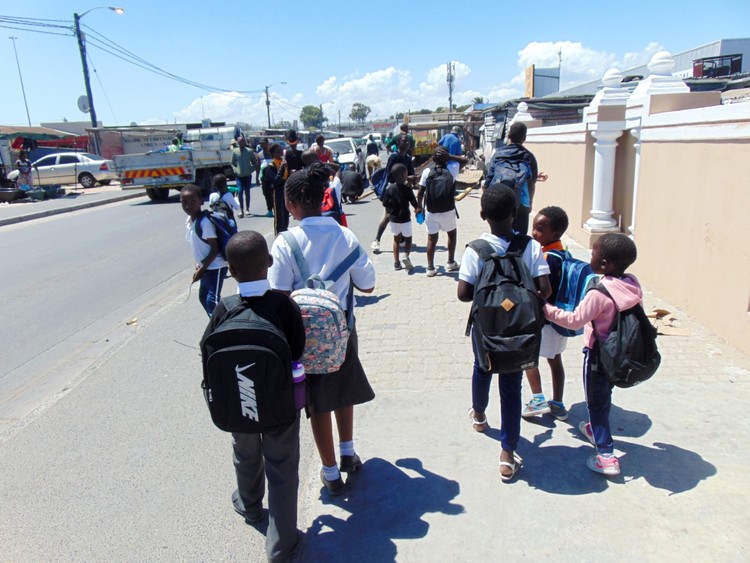
20 February 2023
Many learners from Mfuleni and surrounding areas were prevented from going to school last week by taxi operators who are demanding they be given a contract with the provincial education department. Photos: Masixole Feni
Thousands of learners in Mfuleni, Khayelitsha and surrounding communities in Cape Town were able to travel to school again on Monday morning following protests by taxi operators last week.
The Western Cape Education Department (WCED), said that between 3,000 and 5,000 learners were absent from schools daily last week as taxi drivers and operators intimidated and blocked all private scholar transport from operating.
According to Andile Kanyi, provincial spokesman for Cape Organisation for the Democratic Taxi Association (CODETA), they have been in talks with the department about a partnership for scholar transport since early 2022.
“We met with Deputy Director-General Salie Abrahams and emailed him several times and he never replied. We phoned the department several times. They would say he is not here, leave a message, but never came back to us.
“We have decided to transport children from Khayelitsha free of charge while the buses are not operating in Khayelitsha. We are very surprised by [Education MEC David Maynier] calling us thieves and accusing us of extortion. We don’t understand where those allegations are coming from or what information he received? He doesn’t want to listen to us,” he said.
Last week, taxis blocked some of the main roads in Mfuleni.
In a statement last week Maynier labelled the associations participating in the protests a “Taxi mafia”. He denied that any promises were made to the taxi operators. “The minibus taxi associations appear to be demanding that we allocate transport contracts to them without following tender processes, which we cannot and will not do. It is simply illegal,” he said.
Maynier told GroundUp that during the tender process, potential contractors are required to have specific vehicles to be used on the route. “A contract is only awarded where the vehicles have sufficient seating capacity for all the approved learners on the route. School principals and relevant district officials ensure that Learner Transport Scheme (LTS) contractors adhere to the conditions of this contract. Non-compliance with contractual obligations, including overloading of vehicles, leads to written warnings and eventually the termination of the contract in cases of persistent non-compliance.”
He said other requirements include having a certified and valid licence, roadworthy certificates for each approved vehicle, vehicles with a seating capacity of 16 seats or less, and vehicles must have been tested within six or less months, among other things.
Maynier said these scholar transport vehicles must also be subjected to route and unannounced inspections to monitor compliance. “In cases where non-compliance with contractual conditions is identified, the transgressing contractor must be placed in breach of contract and requested to remedy the breach. Should the contractor not comply, a written report must immediately be submitted to the Directorate: Procurement Management with a recommendation to terminate the contract.”
A parent in Mfuleni, who didn’t want to be identified, told GroundUp that her children who attend Blackheath primary and Kuils River Technical High School were left traumatised after the taxi operators threatened the Avanza scholar transport driver.
She said most learners could not go to school since last Monday. “We may find private cars but we have already paid for our usual transport. It’s difficult because most of us have no money…. We want the [taxi] drivers to stop blocking children from travelling to school. They are not considering the future of our children. They are being selfish,” she said.
Western Cape police say they will monitor engagements between taxi associations and government departments.
The mother said she overheard a taxi driver saying that they are losing business to private scholar transport. “As parents we would like to know how they will manage because in the morning they are also struggling to take people to work. There’s always snaking queues of commuters waiting for a taxi, so how will they manage to take children on time to school?” she asked.
Mavuso Gqola, committee member of the Spiritual Crime Prevention Forum, established in 2021 to fight crime in certain areas, said, “The problem has been ongoing for over two years. Taxis are also expensive and some people in the community are not working. They are living on grants and get help from family and friends with private cars.”
Gqola said the forum will meet with police, taxi bosses and others to try and resolve the impasse. “We have engaged taxis to find a sustainable solution but they say they do not have work and that providing school transport will enable them to earn income,” he said.
Western Cape police spokesperson Novela Potelwa said, “A stern warning is issued to all involved. Western Cape police will not hesitate to take decisive action against those who transgress the law. On another level, SAPS will constantly monitor engagement between taxi associations and the respective government departments.”